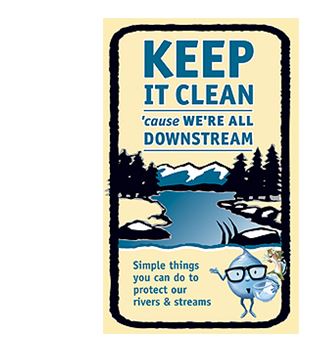Nonpoint source pollution finds its way into water from many different sources. Here are some ways that your family can make a difference:
Manage your household waste
- Around the house or around town, pick up pet waste and dispose of it in the trash.
- Dispose of your garbage properly and recycle when possible (consult your local phone directory for pick-up or drop-off locations).
- Dispose of pharmaceuticals (prescription drugs) properly. Proper Disposal of Medicines
Maintain your septic system
- Have your septic tank pumped regularly (a 3-bedroom house with a 1,000 gallon tank requires pumping every 3-5 years).
- Do not use toilets as trash cans.
- Learn Best Management Practices for Septic Tank Owners
Buy and use products responsibly
- Purchase only non-toxic products including water-based products.
- Dispose of chemcials properly according to product instructions.
- Do not dump excess chemicals into storm drains. Take them to a hazardous waste center (call your county government for locations).
Maintain vehicles
- When washing your car use a commerical car wash which recycles water
 and does not directly discharge into water sources.
and does not directly discharge into water sources. - If you must wash your car at home, do so on the lawn where soapy water can filter into the ground water rather than running along hardened surfaces into water sources.
- Keep your car functioning properly to avoid leaks and spills.
- Dispose of oils and grease properly at a garage or auto parts store.
Practice smart yard maintenance
- Avoid excess evaporation by not watering lawns between 10 am an
 d 6 pm.
d 6 pm. - Avoid over-watering lawns which leads to increased runoff of pollutants.
- Avoid using excessive fertilizers and pesticides in the yard; don't fertilize prior to a rainstorm; and seek natural alternatives to fertilizers and pesticides.
- Where possible, compost organic yard waste including lawn clippings to return natural nutrients to the soil.
Use river friendly landscaping
- Plant native grasses that require less water.
- Plant trees, shrubs, and ground cover, and use straw bales or retaining walls to decrease the amount of erosion around your home.
- Reduce the amount of impervious surfaces by using wood chips, stones, or gravel rather than concrete for walkways and decks.
- Protect existing trees and shrubs as they encourage infiltration of water into the ground and discourage erosion along river banks.

Report illegal dumping or unusual river conditions
- Report any changes in river color or odor.
- Report any unusual looking substances.
- Report any illegal dumping activity.
